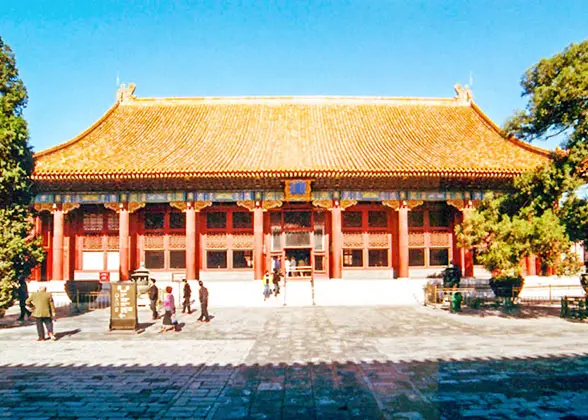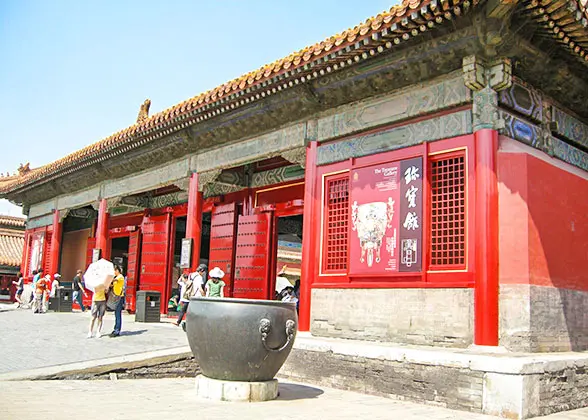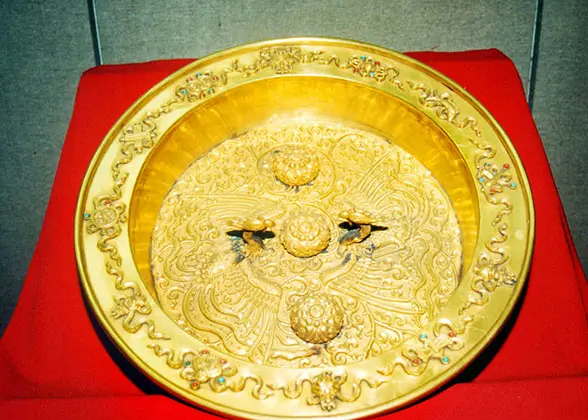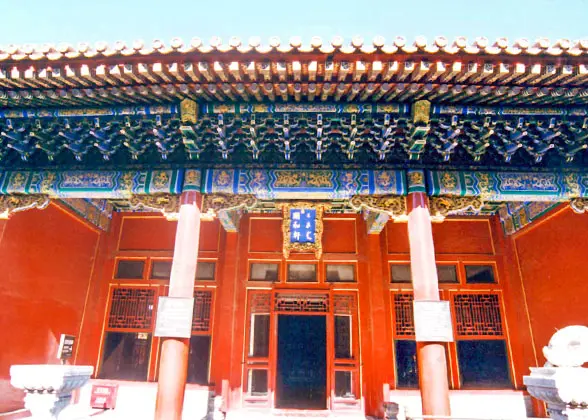Treasure Gallery (Zhenbaoguan)
-- Hall of Spiritual Cultivation, Hall of Joyful Longevity, Belvedere of Well-Nourished Harmony
The Treasure Gallery lies on the north-south axis of the Palace of Tranquil Longevity Area in the northeast of the Palace Museum. Get through the Gate of Spiritual Cultivation (Yangxingmen), to the north of the Palace of Tranquil Longevity (Ningshougong), one can easily find it consisting of three exhibition halls: the Hall of Spiritual Cultivation (Yangxingdian), the Hall of Joyful Longevity (Leshoutang), which were living quarters for the Imperial Regent, the consorts and concubines, and the Belvedere of Well-Nourished Harmony (Yihexuan). These three halls now house gold, silver, pearls, jade, utensils, tea services, imperial robe, phoenix crown, daily necessities as well as furnishings of the Qing Dynasty (1644-1911) imperial family. To the north of the gallery lies the Jingqi Chamber.
Tourists can read the following introduction to learn more about the three halls:
Constructed in year 1772, the 37th year of the reign of Emperor Qing Qianlong (1736-1795), the Hall of Spiritual Cultivation is a smaller imitation of the Hall of Mental Cultivation (Yangxindian) with special layout. Three bays wide and four bays deep, the hall is a structure with yellow glazed and single-eaved roof. It was originally decorated with Hexi-style paintings and decorations. After restoration in the 17th year in the reign of Emperor Guangxu (1875-1908), the decorations and paintings were all changed into Su style except those in the Room of Inky Cloud (Moyunshi). The Hall of Spiritual Cultivation was the sleeping palace for emperors' fathers. When Empress Dowager Cixi lived in the Hall of Joyful Longevity during Guangxu's reign, she had breakfast and supper in this hall.
The East Warmth Chamber of the Hall of Spiritual Cultivation consists of two sections, the front one called mingchuang and the back one called suianshi. The West Warmth Chamber has many cubbies, with the northern hall for Buddha worshipping and the southern Ever Spring Study (Changchunshuwu).
The Hall of Spiritual Cultivation is now the main chamber, exhibiting utensils, tea-services, wine pots and cups made of gold, silver or jade, gold seals and gold albums. There is also a set of 16 gold chimes, which was indispensable at grand occasions. Each of them sounds differently as some other materials were blended with gold.
To the north of the Hall of Spiritual Cultivation is he Hall of Joyful Longevity. It came into being in 1772, restored in 1802 and rebuilt in 1891. The hall is seven bays and three bays deep with corridors around. With a total width of 118.60 feet (36.15m) and a total depth of 76.12 feet (23.20m), the building covers an area of 839 square kilometers. It is a building with yellow glazed tiles and single-eaved roof.
The Hall of Joyful Longevity is masterpiece architecture in the reign of Qianlong. The woodcarving ceiling sets off the interior decoration, giving the hall the air of grace and luxury. Spacious as it was, the hall was where Emperor Qianlong planned to have his study after abdication, hence another name, the Reading Chamber. In 1894, Empress Dowager Cixi, having ostensibly handed over power to Emperor Guangxu (1875-1908), lived in this hall too, sleeping in the west warmth chamber. The celebration of her 60th birthday was also held in the Hall of Joyful Longevity. The expression "leshou" was adopted from the sentence "the wise are joyful and the humane are long-lived" in the Analects.
The Hall of Joyful Longevity is now the second chamber. It mainly exhibits clothes and daily necessities used by the imperial household, such as Emperor Qianlong's imperial robe, the phoenix crown used as a burial object and a priceless ivory mat made of delicate ivory strips about 250 years ago. There also placed the largest jade sculpture of the Forbidden City outside the northern gate of the hall, featuring the story of Yu the Great, a mythical leader conquering the floods. Weighing over 5,000 kg, the jade was quarried at Xinjiang, and freighted to Beijing, then to Yangzhou where it was carved. Ten years passed before the finished sculpture was returned to Beijing. The delicately designed and superbly sculpted jade work is the treasure of the nation.
The Belvedere of Well-Nourished Harmony was erected in 1772, and restored in 1802 and 1891. Standing to the north of the Hall of Joyful Longevity, the belvedere is seven bays wide and one bay deep. A sundial was set at the left side of the platform before the belvedere. On the two sides of the belvedere are corridors with stone carving walls. The Belvedere of Well-Nourished Harmony is now the third chamber, displaying ornaments made of gold, silver, jade, precious stones, jadeite, coral and so on.
 See more: Miraculous Sundials in the Forbidden City
See more: Miraculous Sundials in the Forbidden City
The Treasure Gallery lies on the north-south axis of the Palace of Tranquil Longevity Area in the northeast of the Palace Museum. Get through the Gate of Spiritual Cultivation (Yangxingmen), to the north of the Palace of Tranquil Longevity (Ningshougong), one can easily find it consisting of three exhibition halls: the Hall of Spiritual Cultivation (Yangxingdian), the Hall of Joyful Longevity (Leshoutang), which were living quarters for the Imperial Regent, the consorts and concubines, and the Belvedere of Well-Nourished Harmony (Yihexuan). These three halls now house gold, silver, pearls, jade, utensils, tea services, imperial robe, phoenix crown, daily necessities as well as furnishings of the Qing Dynasty (1644-1911) imperial family. To the north of the gallery lies the Jingqi Chamber.
Tourists can read the following introduction to learn more about the three halls:
Hall of Spiritual Cultivation (Yangxingdian)
The East Warmth Chamber of the Hall of Spiritual Cultivation consists of two sections, the front one called mingchuang and the back one called suianshi. The West Warmth Chamber has many cubbies, with the northern hall for Buddha worshipping and the southern Ever Spring Study (Changchunshuwu).
The Hall of Spiritual Cultivation is now the main chamber, exhibiting utensils, tea-services, wine pots and cups made of gold, silver or jade, gold seals and gold albums. There is also a set of 16 gold chimes, which was indispensable at grand occasions. Each of them sounds differently as some other materials were blended with gold.
|
|
Hall of Joyful Longevity (Leshoutang)
The Hall of Joyful Longevity is masterpiece architecture in the reign of Qianlong. The woodcarving ceiling sets off the interior decoration, giving the hall the air of grace and luxury. Spacious as it was, the hall was where Emperor Qianlong planned to have his study after abdication, hence another name, the Reading Chamber. In 1894, Empress Dowager Cixi, having ostensibly handed over power to Emperor Guangxu (1875-1908), lived in this hall too, sleeping in the west warmth chamber. The celebration of her 60th birthday was also held in the Hall of Joyful Longevity. The expression "leshou" was adopted from the sentence "the wise are joyful and the humane are long-lived" in the Analects.
The Hall of Joyful Longevity is now the second chamber. It mainly exhibits clothes and daily necessities used by the imperial household, such as Emperor Qianlong's imperial robe, the phoenix crown used as a burial object and a priceless ivory mat made of delicate ivory strips about 250 years ago. There also placed the largest jade sculpture of the Forbidden City outside the northern gate of the hall, featuring the story of Yu the Great, a mythical leader conquering the floods. Weighing over 5,000 kg, the jade was quarried at Xinjiang, and freighted to Beijing, then to Yangzhou where it was carved. Ten years passed before the finished sculpture was returned to Beijing. The delicately designed and superbly sculpted jade work is the treasure of the nation.
|
|
Belvedere of Well-Nourished Harmony (Yihexuan)
| Admission Fee: | CNY 10 |
| Opening Hours: | 08:30 to 16:20 (Oct. 16 to Apr.15) 08:30 to 17:00 (Apr. 16 to Oct. 15) |
Go east and west to see the Qianlong Garden & Pavilion of Pleasant Sounds.
Go further west back to the central axis, visit the Imperial Garden (Yuhuayuan), or exit the Forbidden City through the Gate of Divine Prowess (Shenwumen).
How to visit the Forbidden City
Hindustan Jade Bowl in Treasure Gallery of Forbidden City
- Last updated on May. 17, 2022 -
Questions & Answers on Treasure Gallery of Forbidden City
Asked by Hirun from THAILAND | Apr. 09, 2016 03:41 Reply
Reply
We plan to spend a day inside the forbidden city.
Is there any restaurants or coffee shop inside? Is it possible to take a lunch break and re-enter with the same ticket?
Answers (1)
Answered by Tina from SINGAPORE | Apr. 10, 2016 02:58 0
0 0
0 Reply
Reply
Yes, there are restaurants inside, so it is fine to spend a day. But the food and drink is expensive. With a ticket, re-enrty is not allowed.



